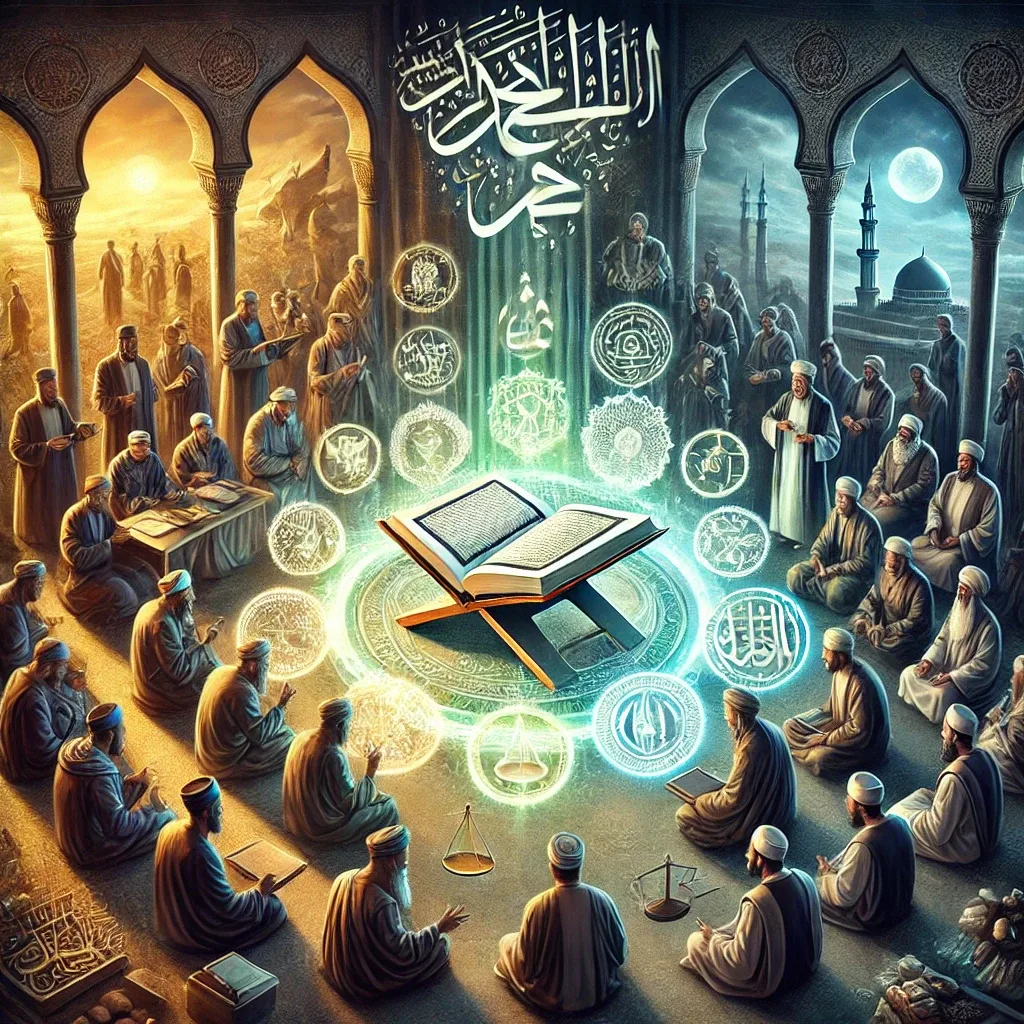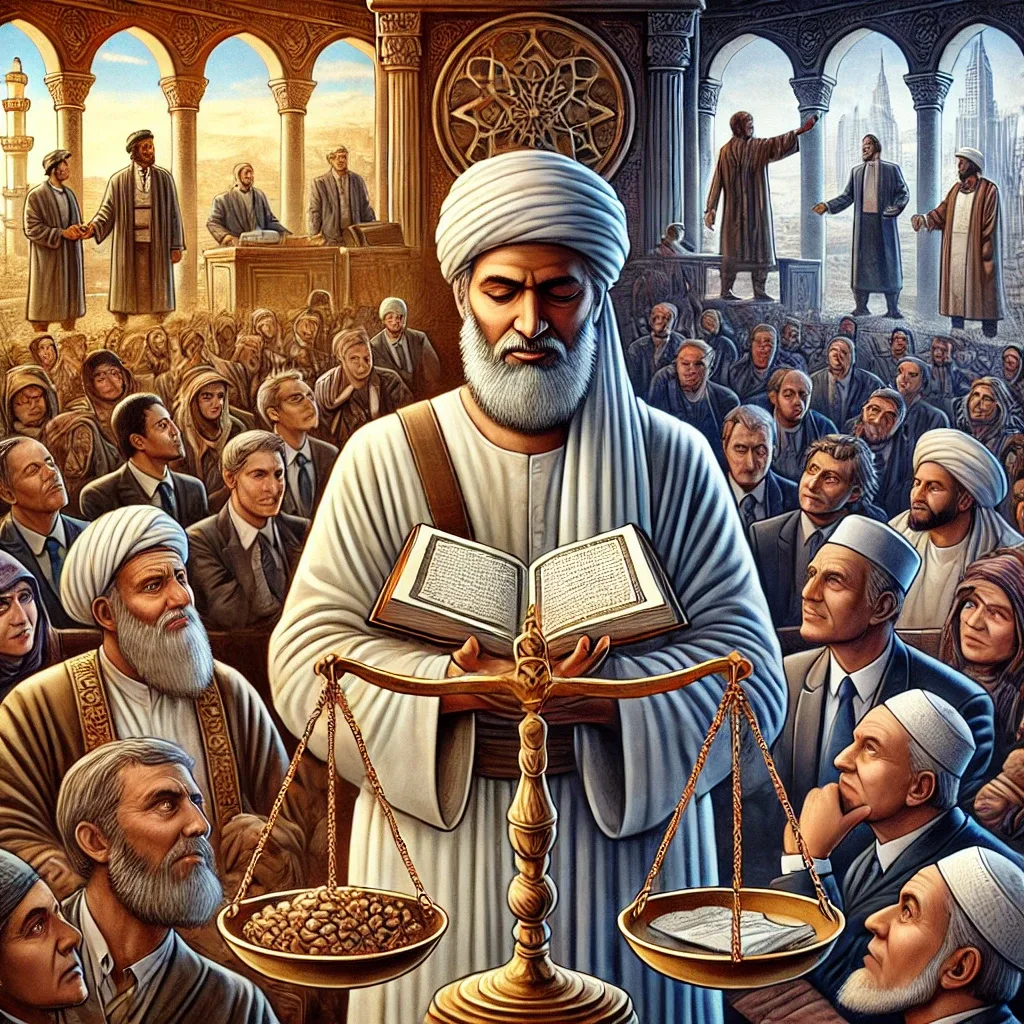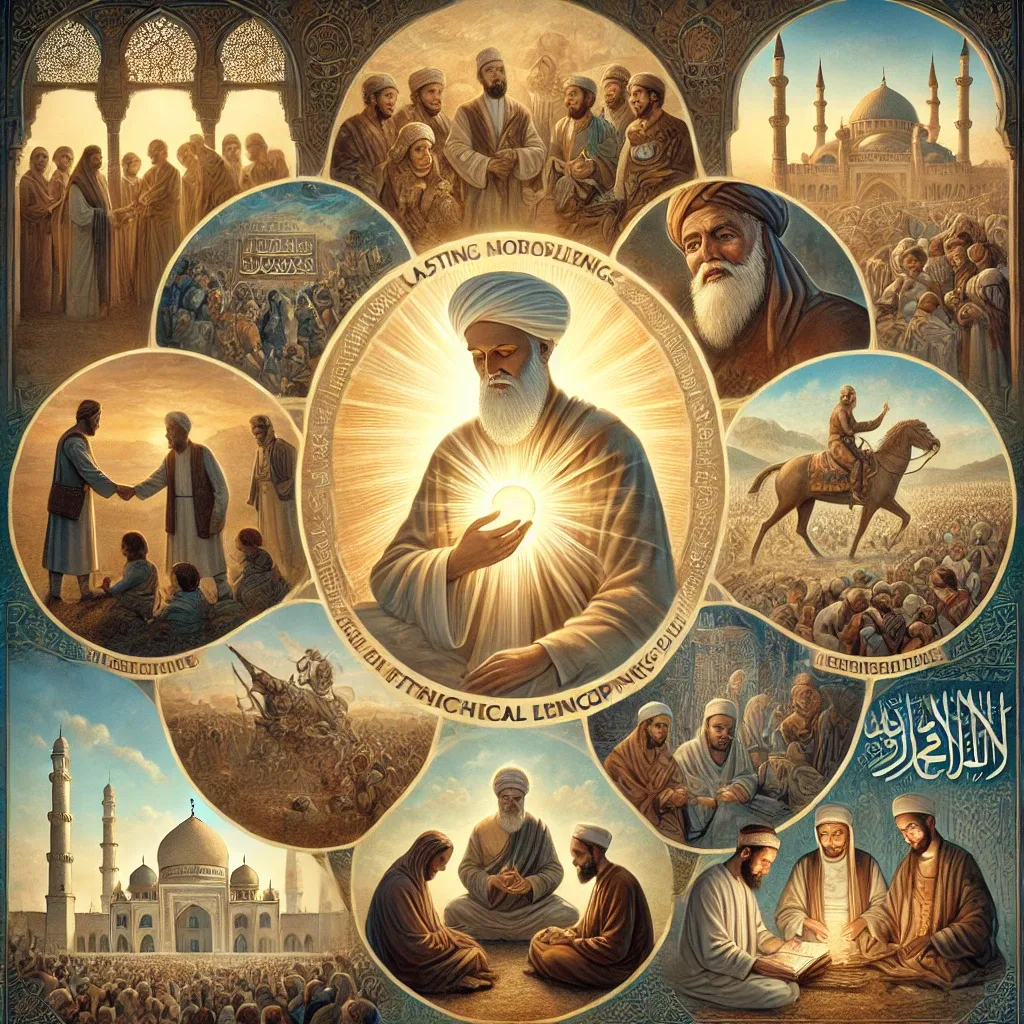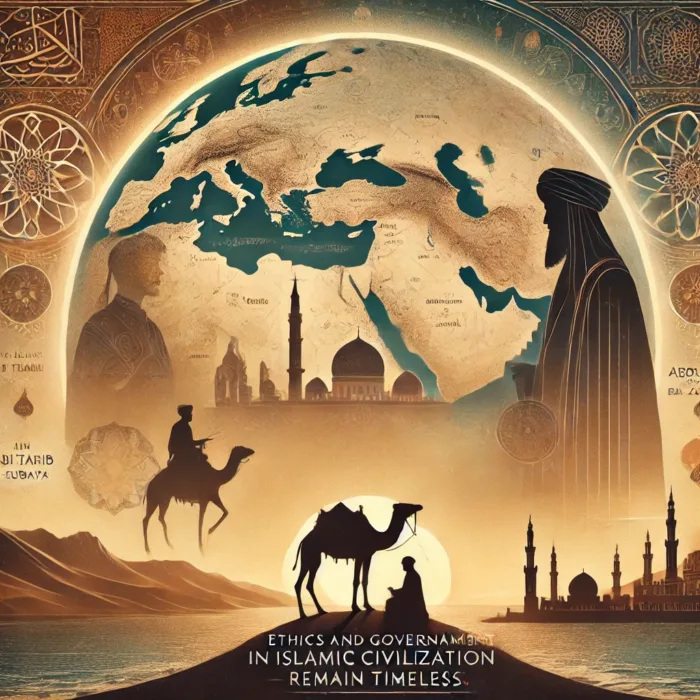Table of Contents
Introduction
The seventh article in the ‘Era of the Rightly Guided Caliphs‘ series delves into the significance of the ethical system in Islamic civilization (Islamic ethics), which is rooted in a solid religious foundation. It examines how this ethical framework shaped the way Muslims assessed historical figures and events, encouraging them to consider more than just material factors when evaluating their leaders and rulers. This stands in contrast to the secular viewpoint, which lacks such a firm ethical basis. This contrasts with the secular perspective, which lacks such a fixed ethical reference. Click here to explore the full series.
The Moral Foundations of Islamic Civilization vs. Secular Ethics
Why do Muslims hold Ali ibn Abi Talib (may ALLAH be pleased with him) in higher regard than Muawiyah ibn Abi Sufyan (may ALLAH be pleased with him)? Why is Al-Hajjaj ibn Yusuf Al-Thaqafi generally disapproved of by Muslims? Why does the unjust execution of Sultan Suleiman the Magnificent’s son, Prince Mustafa, often come up when his biography is discussed? And why don’t Muslims regret their treatment of Jews and Christians who lived in their lands during periods of power and sovereignty? These questions lead us to explore the moral balance within Islamic civilization.
Now, why do we reject secularism? One key reason is that secularism lacks a moral foundation. In Islamic ethics, morality is anchored in religious teachings, but in secularism, which denies God, the only guiding principles are self-interest, personal gain, and the pursuit of power. In such a worldview, the concept of ethics becomes hard to grasp.

What would drive a person to be truthful if lying could bring immense profits? What would inspire someone to show kindness to the poor and vulnerable if achieving success requires cruelty or oppression? In secularism, ethics are often viewed as unnecessary obstacles, secondary to individual desires and ambitions.
Equality and Ethics: The Religious Basis of Human Dignity in Islamic Civilization
Consider the concept of equality among people. What leads us to believe that all individuals have the same status, rights, feelings, aspirations, and desires? Equality is not something that can be proven through science; it is a value rooted in religion. As such, it cannot be fully realized within a secular framework.
Alija Izetbegović, the Muslim president and Mujahid of Bosnia, writes in his insightful book “Islam Between East and West” that true equality and brotherhood among people are only possible if humans are seen as creations of God. Equality, he argues, is a moral quality, not a material one. It is grounded in the belief that human dignity and the equal value of each person are inherent to our nature.
When viewed from a materialistic perspective, people are unequal by default. Without a religious foundation, the void is filled with various forms of inequality—racial, national, social, and political. Human dignity cannot be understood through biology, psychology, or any other science. This is why equality is not a scientific fact, but a moral stance, and the same applies to all ethical principles. Ethics, in this context, do not express scientific truths but reflect a religious perspective.
When ideas lack religious grounding, ethics lose their foundation. This is why a single verse or hadith—such as, “O mankind, indeed WE have created you from male and female and made you peoples and tribes that you may know one another. Indeed, the most noble of you in the sight of ALLAH is the most righteous of you…”1 (Suraat ‘Al-Hujuraat, 49:13)—has more weight and impact than all human rights documents, agreements, and treaties. These human-made texts often fail to be followed by even those who wrote them, as they lack the sacred authority of religious scripture.
The Integration of Ethics and Law in Islamic Jurisprudence
In Islam, its law (Shariah) is deeply rooted in ethics. One of the most notable aspects in the research of Orientalists, particularly legal scholars, is their recognition of this connection between Islamic law and ethics. They often highlight how ethical principles shape the boundaries of Islamic legal norms.
For instance, Jacques Risler, a French Orientalist and legal scholar, points out:
“The Quran provides solutions for all matters, linking religious law with moral law. It aims to establish social order, unity, and to reduce misery, cruelty, and superstition. It advocates for the protection of the vulnerable, encourages righteousness, and calls for mercy“
Similarly, the historian Will Durant emphasizes this link between law and ethics in Islamic law in his book “The Story of Civilization”. He writes:
“Law and ethics in the Quran are one and the same. Religious conduct in both encompasses worldly actions, and every command is inspired by God. The Quran covers rules of conduct for manners, health, marriage, divorce, treatment of children, slaves, animals, commerce, politics, crime, punishment, war, and peace“
In Islamic civilization, scholars were always seen as part of the community rather than part of the ruling authority. The Quran and Sunnah are regarded as infallible texts, written neither by a sultan nor interpreted by any authority-linked entity. This unique perspective allowed Muslim jurists to cultivate a deep moral understanding that is woven throughout Islamic jurisprudence.
The Ethical Governance of the Rightly Guided Caliphate: A Model of Islamic Law in Practice
One of the insightful research papers on this subject was written by the Italian Orientalist David De Santillana, who explores the moral influence in Islamic law. He explains:
“A person’s right is both a private benefit and a moral duty. However, this right has specific limits, which are defined by ethical principles and the public interest. Reconciliation and mutual consent should guide rulings at all times. Revenge is strictly prohibited, physical coercion of debtors is unlawful, and exercising one’s rights to the fullest extent is not permitted if it causes harm to others.
Muslim jurists possess a sharp and refined moral sense in this regard, one that often exceeds our expectations. For instance, it is forbidden for a person to transfer their right to sue to an agent who is an enemy of the party being sued. Similarly, it is unlawful to rent an animal to someone known for cruelty toward animals. In this way, ethics and manners set the boundaries of the law in every situation“
Thus, it becomes clear that Islamic law (Sharia) is deeply intertwined with ethics, which are an inseparable part of its spirit, essence, and core. This ethical dimension defines the limits and rulings of Islamic law.

The Rightly Guided Caliphate was the practical embodiment of Islam’s ethical principles. Through it, the Caliphs demonstrated that it was indeed possible to govern a vast state while adhering to ethical values. This empire, encompassing diverse religions, ethnicities, languages, races, and tribal affiliations, was governed by the Rightly Guided Caliphs with policies that consistently aligned with Islamic ethics, without violating or transgressing these moral principles.
The Caliphs managed to implement a well-regulated ethical policy throughout the various stages of the state:
- During internal wars and external conflicts
- During the initial establishment and early challenges
- During periods of strength, empowerment, and expansion
- During times of prosperity and welfare
Ethical Leadership in Islamic Politics: A Contrast with Contemporary Political Practices
Throughout all these stages and changes, no caliph ever found a justification to violate Islamic principles or overstep ethical boundaries. Instead, they governed both public and political affairs with policies that were consistently grounded in ethics. This stands in stark contrast to contemporary political logic, which often focuses on achieving objectives without regard for the methods used.
In today’s political world, traits like lying, maneuvering, and deception are sadly seen as common among politicians. The more adept someone is at presenting falsehoods in a convincing manner, the greater their chances of rising to power. The more skilled someone is at deceiving and manipulating, the more secure their position in the political arena.
The Rightly Guided Caliphs’ leadership of the Islamic state, which spanned a vast and diverse empire, demonstrates that politics guided by ethical principles can build a powerful and moral state—one where ethics are never compromised, no matter the circumstances.
Moral Leadership and the Legacy of the Rightly Guided Caliphs: The Preference for Ali Over Muawiyah
Based on the model of the Rightly Guided Caliphate, Muslims developed their understanding of politics, history, war, peace, and the dynamics between authority and subjects. This period, representing the era of the Rightly Guided Caliphs, became the benchmark by which all subsequent eras were evaluated.
From a purely materialistic and secular perspective, a comparison might favor Muawiyah over Ali (may ALLAH be pleased with them). Ali’s rule lasted only four years, during which he faced significant challenges, such as not representing unified leadership, the Khawarij breaking away, the emergence of the Shia, and ultimately his assassination by the Khawarij. He struggled to unite the entire Islamic state under his leadership.
In contrast, Muawiyah ruled for twenty years during a period of monarchy, providing stable leadership for his supporters, unifying the ummah under his banner, achieving political successes, and overseeing a period of military conquests. However, this materialistic, secular approach to judging leadership was never the framework used by Muslims throughout history. Instead, Muslims have consistently preferred Ali over Muawiyah and viewed Muawiyah’s party as the one that transgressed. But why?
This preference is rooted in the Prophet’s (Peace be upon Him) hadith about Ammar ibn Yasir:
“The transgressing party will kill him“2
Ammar, who was on Ali’s side, was martyred during the Battle of Siffin. In this instance, it was the prophetic text—the revelation—that guided Muslims to align with Ali’s side, redirecting them from a purely materialistic reading of history to one informed by faith.

Ali ibn Abi Talib (may ALLAH be pleased with him) was a part of the Rightly Guided Caliphate, a caliph whom the Prophet (Peace be upon Him) described in His hadith:
“You must follow My Sunnah and the Sunnah of the Rightly Guided Caliphs after Me“3,
and also said,
“The Caliphate after Me is 30 years“4
In contrast, Muawiyah (may ALLAH be pleased with him) was the first of the Islamic kings and marked the beginning of the monarchy period.
Muslims prefer Ali over Muawiyah, not according to secular material standards, but because of the moral framework shaped by religious texts and the legacy of the Rightly Guided Caliphs.
The Ethical Struggle for Leadership: AbduLLAH bin Al-Zubayr vs. Abdul Malik bin Marwan
The same reasoning applies to the situation between Abdul Malik bin Marwan and AbduLLAH bin Al-Zubayr. AbduLLAH bin Al-Zubayr, a companion of the Prophet (Peace be upon Him), served as caliph for nine years, with Mecca as his capital. He was widely supported by the ummah, except for a portion of Syria, which was controlled by the Umayyads under Marwan bin Al-Hakam and later Abdul Malik bin Marwan. Over time, Syrian territories expanded and took control of lands held by AbduLLAH bin Al-Zubayr, until Abdul Malik bin Marwan ultimately triumphed.
From a purely material perspective, one might immediately favor Abdul Malik bin Marwan. However, from the Islamic viewpoint, AbduLLAH bin Al-Zubayr is still favored and viewed with sympathy. He is preferred over Abdul Malik, who is seen as the first king of domination—a necessary outcome when the Islamic ummah had no alternative but to accept a ruler who could maintain control while enforcing Shariah and its boundaries.
The Moral Legacy of Islamic Heroes: Critique and Context in Islamic Historiography
Interestingly, unlike in common historical, philosophical, and intellectual traditions, Muslim scholars and historians often critique historical figures who, in other contexts—such as Western traditions—would be regarded as great historical heroes.
Figures like Abdul Malik bin Marwan, Hisham bin Abdul Malik, Abu Jafar Al-Mansur, Suleiman the Magnificent, Sultan Selim, Baibars, Saif Al-Din Qalawun, and many others would be considered unparalleled champions if they were not part of the Islamic nation. However, through the lens of Islamic values, Muslim consciousness, and the perspective of Muslim historians, these figures’ mistakes are acknowledged, and they are not held up as role models. Instead, the exemplary status is reserved for the Rightly Guided Caliphs.
This moral sensitivity in Islamic history may sometimes seem overly strict. For instance, figures like Al-Hajjaj bin Yusuf Al-Thaqafi and Yazid bin Muawiyah, who are harshly judged in Islamic history, would likely be praised for their material achievements if they were in a non-Islamic context. In other histories, many heroes who committed far greater scandals and massacres than those attributed to Al-Hajjaj or Yazid continue to be celebrated as heroes in their respective traditions.
Ethics in Conquest: Justice and Accountability in Early Islamic Governance
Ethics play a central role in shaping Muslims’ consciousness when evaluating their history and historical figures. When the Rightly Guided Caliphs established their ethically-bound state, the behaviors of their subjects stood in stark contrast to those seen in colonial empires, especially in their treatment of conquered peoples.
Take, for example, the story of a Coptic man from Egypt who traveled to Medinah to complain about the actions of Amr ibn Al-As’s son, the governor of Egypt. This same man, who had only two or three years earlier endured Roman massacres and persecution without daring to protest, now felt confident enough to make the long journey from Egypt to Medinah in search of justice—and he found it.

In another instance, the people of Samarkand, located in Central Asia, filed a complaint to the Islamic judge in Damascus, accusing the Muslim army that had entered their city of violating the principles of Islamic conquests. They traveled all the way from Samarkand to Damascus to report the army’s actions. Upon hearing their complaint, the judge ordered the army to leave the city, return their gains, and adhere to the rules of Islamic conquests as outlined in Sharia. This decision was implemented, and the army followed the legal directives. Such events are unparalleled in the history of any empire.
The Lasting Moral Influence of Islam: How Ethical Leadership Shaped the Spread of the Faith
The renowned French Orientalist Gustave Le Bon once remarked:
“Muhammad imparted lessons in ethics and civilization that remain unforgettable to this day“
The distinguished historian Dr. Hussein Mu’nis, in his book “Islam the Conqueror”, compared regions that Muslims conquered with those that embraced Islam without conquest. He concluded that two-thirds of the Islamic world accepted Islam peacefully, without the need for military conquest. Muslims only conquered one-third of the territory, highlighting how the compelling moral example set by Muslims led many to embrace ALLAH’s religion in large numbers.
I ask ALLAH, the Blessed and Exalted, to grant us beneficial knowledge, to make us benefit from what HE has taught us, and to increase us in knowledge.
Sources:
- Mohamed Elhamy. محمد إلهامي | عصر الخلافة الراشدة | 7. الميزان الأخلاقي للحضارة الإسلامية. YouTube Video.

